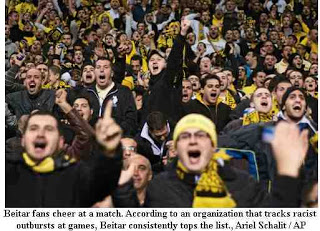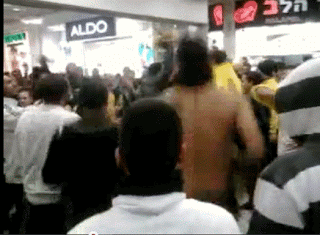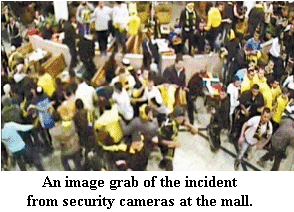Beitar fans in Jerusalem, notorious for their anti-Arab racism, beat up Arab cleaners in a shopping mall to ‘celebrate’ their home side’s victory. What is though unbelievable, and is in itself a testimony to the deep racism within all sectors of Israeli society, especially the state, no one was arrested.
The Police excuse was that no complaints had been filed! Is it any wonder? Imagine that hundreds of Arabs had beat up Jewish workers. Would the Police have waited for a complaint to arrest people? Everyday Palestinians are arrested for peacefully demonstrating by the Army or Police. They don’t get any complaints but pro-actively go out to make the arrests and of course do much worse.
Imagine that before Police could intervene in last summer’s riots, they had to get a complaint from the shop owner!
But the roots of the fans’ racist behaviour are endemic to both Israeli society and Zionism, after all Israel is a ‘Jewish’ state and in Beitar’s case, the fact that the club management operates policy of not having Arab players. When Beitar captain Aviram Baruchyan announced in 2009 that he would like to see Arabs on the team, fans bombarded him with criticism, prompting him to recant. “The most painful thing is that I unfortunately hurt Beitar’s fans, and I understood that I hurt them very much,” he said after a reconciliation meeting with members of La Familia, a Beitar fan club. “I don’t care what other people think or write.” See No Arabs Allowed
Feb 20, 2012 12:00 AM EST
Jerusalem’s favorite football team has hiring policies reminiscent of Apartheid and Jim Crow.
Tony Greenstein
Hundreds of Beitar Jerusalem fans beat up Arab workers in mall; no arrests Despite CCTV footage, no one arrested after the incident at Malha shopping center on Monday; Jerusalem police say arrests not made because no complaints filed.
Despite CCTV footage, no one arrested after the incident at Malha shopping center on Monday; Jerusalem police say arrests not made because no complaints filed.
By Oz Rosenberg
Hundreds of Beitar Jerusalem supporters assaulted Arab cleaning personnel at the capital’s Malha shopping center on Monday, in what was said to be one of Jerusalem’s biggest-ever ethnic clashes. “It was a mass lynching attempt,” said Mohammed Yusuf, a team leader for Or-Orly cleaning services.
Despite CCTV footage of the events, no one was arrested. Jerusalem police said that is because no complaint was filed. Witnesses said that after a soccer game in the nearby Teddy Stadium, hundreds of mostly teenage supporters flooded into the shopping center, hurling racial abuse at Arab workers and customers and chanting anti-Arab slogans, and filled the food hall on the second floor.
“I’ve never seen so many people,” said A, a shopkeeper. “They stood on chairs and tables and what have you. They made a terrible noise, screamed ‘death to the Arabs,’ waved their scarves and sang songs at the top of their voices.”
Shortly afterward, several supporters started harassing three Arab women, who sat in the food hall with their children. They verbally abused and spat on them.
Some Arab men, who work as cleaners at the shopping center and observed the brawl, came to their rescue. “How can you stand aside and do nothing?” said Akram, a resident of the Old City’s Muslim Quarter who was one of the cleaners who got involved. CCTV footage shows that they started chasing the rioting youths, wielding broomsticks.
It seemed the workers managed to chase the abusers away, but a few minutes later supporters returned and assaulted them. “They caught some of them and beat the hell out of them,” said Yair, owner of a bakery located in the food hall. “They hurled people into shops, and smashed them against shop windows. I don’t understand how none shattered into pieces. One cleaner was attacked by some 20 people, poor guy, and then they had a go at his brother who works in a nearby pizza shop and came to his rescue.”
The attackers also asked Jewish shop owners for knives and sticks to serve as weapons but none consented, witnesses said. Avi Biton, Malha’s security director, sent a force of security guards in an attempt to restore order, but they were outnumbered. He called the police who arrived in large numbers about 40 minutes after the brawl started. At about 10.30 P.M., they evacuated the mall and the management shut its doors.
“I’ve been here for many years and I’ve never seen such a thing,” said Gideon Avrahami, Malha’s executive director. “It was a disgraceful, shocking, racist incident; simply terrible.”
Biton said that his department would step up security measures when Beitar matches take place. “This event was unusual for Beitar fans,” he said. “We’ve learned our lesson and from now on we’ll make more serious preparations ahead of Beitar games.”
Beitar fans are known for their staunchly anti-Arab positions and have been previously involved in attacks on Arabs.
On Tuesday, a day after the incident, Avrahami gathered the mall workers and apologized to them. “He promised it would never happen again,” said Akram.
Beitar Jerusalem’s management said in a statement that the club “firmly condemns violence and leaves it to the treatment of the authorities.”
Anti-Arab soccer fans rampage in shopping centre – but no arrests
Buoyed by a home win, Jewish fans of football club Beitar Jerusalem this week rampaged through a nearby shopping centre following an evening match, attacking Arab workers and shoppers in one of the worst racial brawls seen in the city in recent years.
The entire episode, which occurred at Jerusalem’s Malha Mall on Monday night, was captured on closed-circuit television, but Israeli police made no arrests, and the incident received no media attention until yesterday, prompting fury in Israel’s blogosphere.
The attacks are the culmination of a long record of violent and anti-Arab behaviour by ultranationalist fans at Beitar, a club identified with Prime Minister Benjamin Netanyahu’s right-wing Likud party. The Israeli Football Association’s efforts to rein in the club’s unruly fans have so far met with limited success.
The incident started after a game at Jerusalem’s Teddy Stadium, where Beitar beat Tel Aviv’s Bnei Yehuda, saving the once successful team from imminent relegation. Hundreds of fans, mostly teenagers, descended on busy Malha Mall, jumping on tables, waving scarves, and chanting “Death to Arabs”.
When a group of fans started to heckle and spit on Palestinian women dining with their children in the food hall, the centre’s Arab cleaning staff rushed to their defence and chased the fans off. But moments later, the fans returned, and started to attack the Arab staff.
“They [the fans] caught some of them and beat the hell out of them,” Yair, the Jewish owner of a bakery in the shopping centre, told Israel’s Haaretz newspaper. “They hurled people into shops, and smashed them against shop windows. … One cleaner was attacked by some 20 people, poor guy.” The brawl might have turned deadly, but food hall staff refused to respond to fans’ demands for knives and sticks. It was only when police arrived 40 minutes later the situation was brought under control.
“I’ve been here many years and I’ve never seen such a thing,” Haaretz quoted Gideon Avrahami, Malha’s director, as saying. “It was a disgraceful, shocking, racist incident; simply terrible.”
The police defended its failure to make any arrests, saying it had received no complaints from any of the public, a response that drew immediate derision. “No complaints and no arrests. Does this mean riots against Arabs in malls is acceptable behaviour in Israel?” tweeted Joseph Dana, an Israeli blogger.
Shmulik Ben Rubi, a Jerusalem police spokesman, later told The Independent the police would investigate the incident, which might lead to arrests.
But many believe the shopping mall riot is part of a wider malaise in Israeli society, where the country’s Arab minority, 20 per cent of all Israelis, is discriminated against, often with impunity. Beitar, the most overtly racist club in the country, has an unspoken policy it does not hire Israeli Arab players, in part because of the backlash management would face from its die-hard fans.
Bad behaviour is endemic in the stands, where fans heckle Arab and black players from opposing teams. Israel’s FA tried to penalise the team for the fans’ behaviour by docking Beitar points and making the team play in an empty stadium, moves criticised as failing to hold individual perpetrators to account.
See also




